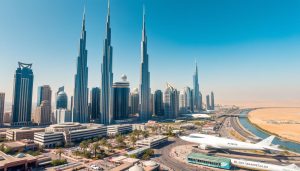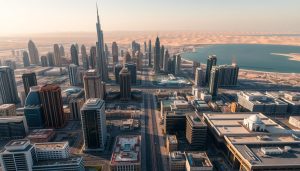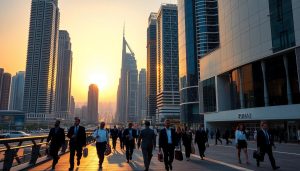The United Arab Emirates continues to cement its position as a global business hub, with ambitious economic diversification plans driving growth across multiple sectors. As we look toward 2026, the UAE’s vision for economic transformation presents unprecedented opportunities for international businesses seeking expansion into Gulf markets. With strategic initiatives like the UAE’s 2023-2026 FDI strategy and continued infrastructure development, the timing for market entry has never been more favorable.
Each emirate offers distinct advantages for business expansion, with Dubai, Abu Dhabi, and Sharjah emerging as the top three markets for 2026. These emirates have developed unique economic ecosystems that cater to different industries and business models, providing multiple pathways for successful market entry. Understanding the specific strengths and opportunities in each location is crucial for developing an effective expansion strategy.
In this comprehensive guide, we’ll explore the key industries, regulatory frameworks, and infrastructure developments that make these three emirates the most promising markets for business expansion in 2026. We’ll also highlight recent policy changes and provide strategic recommendations to help you navigate the Emirati business landscape successfully.
Dubai: The Commercial Gateway to the Middle East
Dubai has long been the UAE’s commercial powerhouse, and its trajectory toward 2026 shows no signs of slowing. With a population expected to reach 4 million by 2026 according to recent projections, Dubai’s consumer market is expanding rapidly, creating significant business opportunities across multiple sectors. The emirate’s strategic location, world-class infrastructure, and business-friendly policies make it an ideal entry point for companies looking to establish a regional presence.
Key Industries Driving Growth
Dubai’s economy continues to diversify beyond its traditional strengths in trade and tourism. By 2026, several sectors are projected to experience substantial growth:
Technology and Digital Transformation: Dubai’s Smart City initiative and investments in artificial intelligence, blockchain, and fintech are creating a thriving tech ecosystem. The Dubai Digital Economy Strategy aims to increase the sector’s contribution to GDP significantly by 2026.Retail and E-commerce: With a growing population and increasing consumer spending, Dubai’s retail sector is evolving rapidly. The emirate’s e-commerce market is expected to reach $8 billion by 2026, offering substantial opportunities for digital retail platforms.Logistics and Supply Chain: Dubai’s strategic position between East and West continues to strengthen its role as a global logistics hub. The expansion of Jebel Ali Port and Al Maktoum International Airport will further enhance capacity by 2026.Healthcare and Life Sciences: Dubai Healthcare City is driving innovation in medical services and biotechnology. The emirate’s focus on medical tourism and healthcare technology presents significant opportunities for specialized providers.Sustainable Development: In line with the UAE’s commitment to net-zero emissions by 2050, Dubai is investing heavily in renewable energy and green building technologies, creating new markets for sustainable solutions. Regulatory Advantages
Dubai offers several regulatory benefits that make it particularly attractive for business expansion:
100% Foreign Ownership: Recent amendments to the Commercial Companies Law allow complete foreign ownership across most mainland sectors, eliminating the previous requirement for a local partner.Free Zone Ecosystem: Dubai’s 30+ specialized free zones offer industry-specific benefits, including tax exemptions, customs duty benefits, and streamlined licensing processes. Dubai free zones like DIFC, DWTC, and Dubai South continue to expand their offerings for 2026.Simplified Business Setup: The Department of Economy and Tourism has streamlined business registration processes, reducing bureaucracy and making it easier for entrepreneurs to establish operations.Long-term Visas: The Golden Visa program and other long-term residency options provide stability for business owners and key employees, facilitating talent retention and business continuity. Infrastructure Developments
Dubai’s infrastructure continues to evolve, with several major projects set to reach completion or significant milestones by 2026:
Dubai Exhibition Centre Expansion: The AED10 billion expansion masterplan will transform DEC into the region’s largest indoor events venue, doubling the number of large-scale events hosted annually from 300 to over 600 by 2033.Dubai 2040 Urban Master Plan: This comprehensive development plan is reshaping the city’s layout, creating integrated communities and enhancing quality of life through sustainable urban planning.Transportation Network: The expansion of the Dubai Metro, including the Route 2020 extension, is improving connectivity across the emirate, making it easier for businesses to access different markets and talent pools.Digital Infrastructure: Continued investments in 5G networks, data centers, and smart city technologies are creating one of the world’s most connected business environments.Success Case Study: Fintech Innovation
The success of Prypco Mint, the Middle East’s first tokenized real estate platform, illustrates Dubai’s potential for innovative financial technology ventures. Launched in 2025 through a collaboration between Dubai Land Department, the Virtual Assets Regulatory Authority, and the Central Bank of UAE, the platform enables investments in fractional real estate from just AED 2,000.
Within its first phase, the platform attracted 224 investors from 44 nationalities, with 70% being first-time entrants to Dubai’s real estate market. This case demonstrates how Dubai’s regulatory framework, digital infrastructure, and market demand can combine to create successful business models that were previously impossible in the region.
Abu Dhabi: The Capital of Sustainable Innovation
As the UAE’s capital and largest emirate, Abu Dhabi is leveraging its substantial resources to position itself as a global center for sustainable innovation and knowledge-based industries. With a strategic focus on economic diversification through its Economic Vision 2030, Abu Dhabi is creating a robust ecosystem for businesses focused on future-oriented sectors.
Key Industries Driving Growth
Abu Dhabi’s economic landscape is evolving rapidly, with several sectors showing particular promise for business expansion by 2026:
Clean Energy and Climate Technology: Through initiatives like Masdar City and substantial investments in renewable energy, Abu Dhabi is becoming a global hub for clean technology innovation. The emirate aims to increase renewable energy capacity significantly by 2026.Advanced Manufacturing: The Industrial Development Bureau’s strategic focus on Industry 4.0 is transforming Abu Dhabi’s manufacturing sector, creating opportunities for businesses specializing in automation, robotics, and advanced materials.Financial Services: Abu Dhabi Global Market (ADGM) continues to expand its role as an international financial center, with particular strengths in asset management, private banking, and financial technology.Life Sciences and Healthcare: The development of Masdar City’s healthcare cluster and investments in biotechnology research are positioning Abu Dhabi as a center for healthcare innovation in the region.Tourism and Hospitality: With the development of cultural attractions like the Louvre Abu Dhabi and Saadiyat Cultural District, the emirate is diversifying its tourism offerings beyond business travel, creating opportunities in the hospitality and experience economy sectors.Regulatory Advantages
Abu Dhabi offers a distinct regulatory environment with several advantages for businesses:
Economic Zones: Specialized economic zones like ADGM, Masdar City, and Khalifa Industrial Zone Abu Dhabi (KIZAD) offer industry-specific incentives and regulatory frameworks designed to support business growth.Research and Development Incentives: Through programs like the Ghadan 21 accelerator initiative, Abu Dhabi provides substantial support for R&D activities, including grants, subsidies, and access to research facilities.Sovereign Investment Partnerships: Abu Dhabi’s sovereign wealth funds actively seek strategic partnerships with innovative companies, providing not just capital but also market access and institutional support.Intellectual Property Protection: ADGM’s legal framework, based on English common law, provides robust protection for intellectual property, making it an attractive location for knowledge-intensive businesses.Infrastructure Developments
Abu Dhabi continues to invest heavily in infrastructure projects that will enhance its business environment by 2026:
Etihad Rail: The national railway network will connect Abu Dhabi with other emirates and neighboring countries, transforming logistics and creating new supply chain opportunities.Midfield Terminal: The new terminal at Abu Dhabi International Airport will significantly increase passenger capacity and cargo handling capabilities, enhancing the emirate’s connectivity.Smart City Infrastructure: Investments in IoT networks, data analytics capabilities, and smart utility systems are creating an advanced digital ecosystem for businesses.Sustainable Urban Development: Projects like Masdar City and the expansion of Saadiyat Island are creating integrated communities that combine residential, commercial, and recreational spaces with sustainable design principles.Success Case Study: Luxury Real Estate Innovation
The rapid sell-out of all 133 homes at Waldorf Astoria Residences Yas, generating AED850 million ($231 million) in sales, demonstrates Abu Dhabi’s growing appeal for luxury developments. As the first branded residential development on Yas Island, the project attracted a diverse buyer base with 76% of purchases coming from expatriate residents and international investors.
The development’s success highlights Abu Dhabi’s evolution as a premium lifestyle destination and illustrates how strategic location selection (near Yas Links Golf Course and Yas Marina Circuit) combined with international brand partnerships can create compelling value propositions in the emirate’s real estate market.
Sharjah: The Cultural and Educational Hub
Often overshadowed by its neighbors, Sharjah has been quietly developing a distinctive economic identity focused on education, culture, and light manufacturing. With lower operational costs than Dubai and Abu Dhabi, Sharjah offers a compelling value proposition for businesses looking for cost-effective entry into the UAE market while still benefiting from proximity to major commercial centers.
Key Industries Driving Growth
Sharjah’s economic development strategy emphasizes several sectors that show particular promise for 2026:
Education and Research: Home to University City, which hosts branches of several international universities, Sharjah is positioning itself as the UAE’s education hub. This creates opportunities for educational technology, research services, and student-focused businesses.Creative Industries: Sharjah’s designation as a UNESCO Creative City and investments in facilities like the Sharjah Publishing City Free Zone are fostering growth in publishing, design, media, and other creative sectors.Light Manufacturing: The emirate’s industrial areas and cost advantages make it attractive for manufacturing operations, particularly in sectors like furniture, packaging, and consumer goods.Healthcare Services: Sharjah Healthcare City is developing as a specialized zone for medical services, creating opportunities for specialized clinics, medical equipment suppliers, and healthcare support services.Environmental Technologies: Sharjah’s focus on sustainability, exemplified by projects like the Sharjah Sustainable City, is creating demand for green building materials, waste management solutions, and renewable energy systems.Regulatory Advantages
Sharjah offers several regulatory benefits that make it attractive for certain types of businesses:
Cost-Effective Licensing: Business setup and licensing costs in Sharjah are generally lower than in Dubai and Abu Dhabi, making it an attractive option for SMEs and startups.Specialized Free Zones: Facilities like Sharjah Publishing City Free Zone, Sharjah Research Technology and Innovation Park, and Sharjah Media City offer industry-specific benefits and 100% foreign ownership.Cultural Investment Incentives: Sharjah offers specific incentives for businesses in the cultural and creative sectors, including subsidized spaces and participation in international events.Industrial Zoning: The emirate’s well-established industrial areas provide specialized infrastructure and regulatory frameworks for manufacturing businesses.Infrastructure Developments
Sharjah continues to enhance its infrastructure to support business growth:
Transportation Connectivity: The development of the Khorfakkan Highway and improvements to connections with other emirates are enhancing Sharjah’s accessibility and reducing commute times.Sustainable Communities: Projects like Sharjah Sustainable City and Aljada are creating integrated communities that combine residential, commercial, and recreational spaces with sustainable design principles.Research Facilities: The expansion of the Sharjah Research Technology and Innovation Park is creating advanced facilities for R&D activities across multiple sectors.Port Expansion: Ongoing development at the ports of Sharjah and Khorfakkan is enhancing the emirate’s logistics capabilities and supporting its manufacturing sector.Strategic Recommendations for UAE Market Entry
When planning your expansion into the UAE for 2026, consider these strategic recommendations to maximize your chances of success:
Market Selection Strategy
Industry-Based Selection: Choose your location based on your industry’s alignment with each emirate’s economic priorities. Technology and service businesses may thrive in Dubai, sustainable innovation ventures in Abu Dhabi, and education or cultural businesses in Sharjah.Cost-Benefit Analysis: Consider the total cost of operation across different emirates, including licensing, real estate, staffing, and logistics. While Dubai offers maximum visibility, Sharjah may provide better margins for certain business models.Multi-Emirate Approach: Consider a phased expansion strategy that leverages the strengths of multiple emirates. For example, establish headquarters in Dubai for market access while locating back-office operations in Sharjah for cost efficiency.Free Zone vs. Mainland: Carefully evaluate whether a free zone or mainland setup better serves your business objectives. Free zones offer 100% ownership and tax benefits but may have restrictions on conducting business within the UAE market.Regulatory Navigation
Local Partnership: Despite 100% foreign ownership being available, strategic partnerships with established UAE entities can accelerate market entry and provide valuable local knowledge.Legal Structure Optimization: Work with specialists to determine the optimal legal structure for your business, considering factors like tax implications, capital requirements, and operational flexibility.Compliance Planning: Develop a comprehensive compliance strategy that addresses UAE-specific requirements, including VAT regulations, labor laws, and data protection standards.Visa Strategy: Plan your human resources approach with consideration for the UAE’s visa options, including the expanded Golden Visa program for entrepreneurs and specialized talent.Market Entry Execution
Phased Approach: Consider a staged market entry that begins with a representative office or free zone entity before expanding to a full mainland operation.Digital-First Strategy: Leverage the UAE’s advanced digital infrastructure to establish market presence through digital channels before significant physical investment.Cultural Adaptation: Invest in localizing your offering to meet the specific preferences and requirements of the UAE market, considering both local and expatriate consumer segments.Talent Strategy: Develop a comprehensive approach to talent acquisition and retention, considering the competitive labor market and the importance of cultural competence.Conclusion: Seizing the UAE Opportunity in 2026
The UAE’s economic landscape in 2026 presents a compelling opportunity for international businesses seeking growth in stable, dynamic markets. Each of the top three emirates—Dubai, Abu Dhabi, and Sharjah—offers distinct advantages that can align with different business models and objectives. By understanding these differences and strategically selecting your market entry point, you can position your business for long-term success in the Gulf region.
Dubai’s commercial dynamism, Abu Dhabi’s focus on sustainable innovation, and Sharjah’s cultural and educational strengths create a diverse ecosystem that can accommodate a wide range of business types. The UAE’s continued investments in infrastructure, regulatory improvements, and economic diversification further enhance its attractiveness as an expansion destination.
As you plan your entry into the UAE market, consider not just the immediate opportunities but also the long-term strategic value of establishing a presence in one of the world’s most forward-thinking business environments. With careful planning and the right local support, your business can thrive in the UAE’s vibrant economy.












